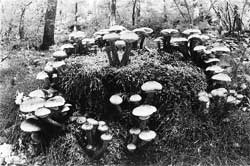Set a thief
 zenaca today, a British agrochemical company, has recently launched the most widely-acting and versatile fungicide ever developed. Amistar, as it is called, can kill almost any fungal infection on almost any fruit, vegetable or cereal crop without posing a threat to wildlife or the environment.
zenaca today, a British agrochemical company, has recently launched the most widely-acting and versatile fungicide ever developed. Amistar, as it is called, can kill almost any fungal infection on almost any fruit, vegetable or cereal crop without posing a threat to wildlife or the environment.
Its active ingredient, Azoxystrobin, is based on natural anti-fungal chemicals which forest mushrooms such as Oudemansiella mucida secrete to prevent the growth of competing species. Zenaca scientists discovered these chemicals called strobilurins, and the agrochemical industry turned to them as a potential source for new fungicides. The natural chemicals are unstable for agricultural use, so researchers identified parts of the molecules responsible for their fungicidal action. Then they synthesised thousands of similar strobilurins by testing them in the laboratory and greenhouse for their activity, mobility, toxicity and stability.
The strobilurins have a novel biochemical mode of action, which makes them effective against fungi that have developed resistance to other fungicides. They work by penetrating the cell wall and attacking the mitochondria, the cell's energy generators; deprived of energy, the fungal cells die.
Field trials of Amistar have been carried out on 60 crops. Commercially important targets include rice, banana, vines, peanuts, and a wide range of vegetables. According to Zenaca, the trials indicated that Amistar is the only commercial fungicide that has a high level of activity against fungal groups that attack crops. The company is trying to get Amistar approved in all the important markets in the world.
The Amistar pilot plant is in Grangemouth, Scotland. The fungicide has been submitted to 30 regulatory authorities. Germany was the first to approve it, followed by the uk and the us.
